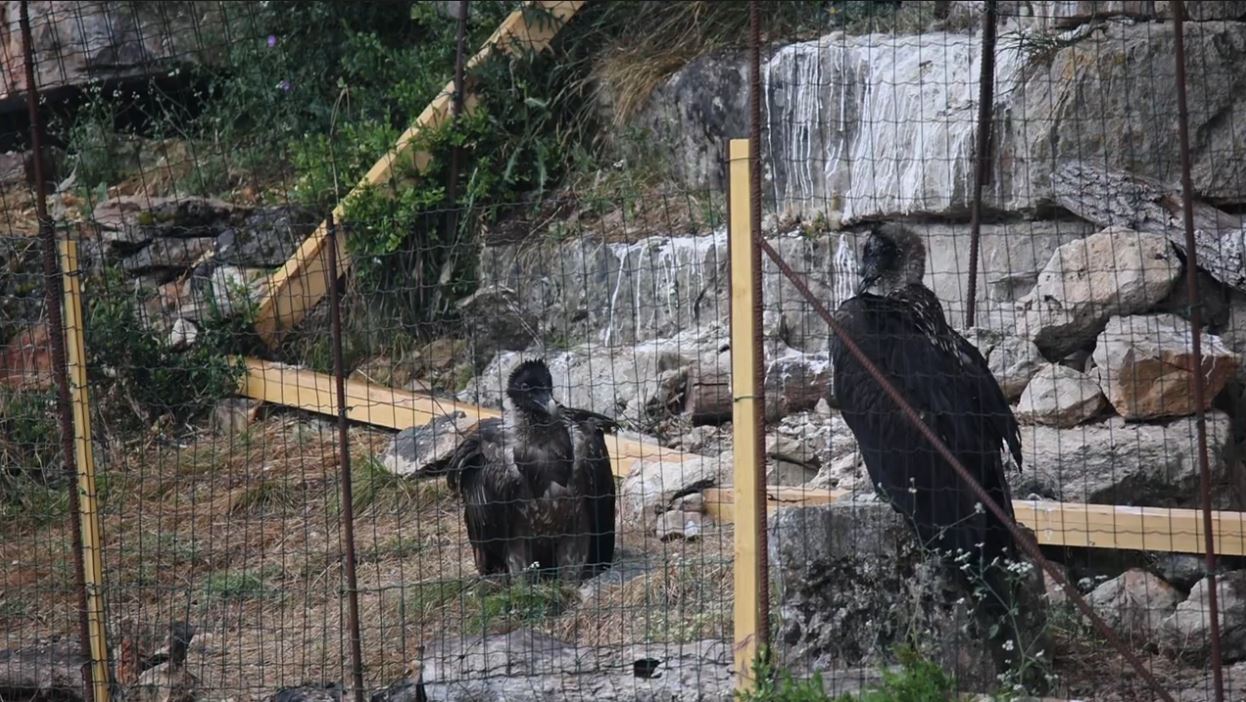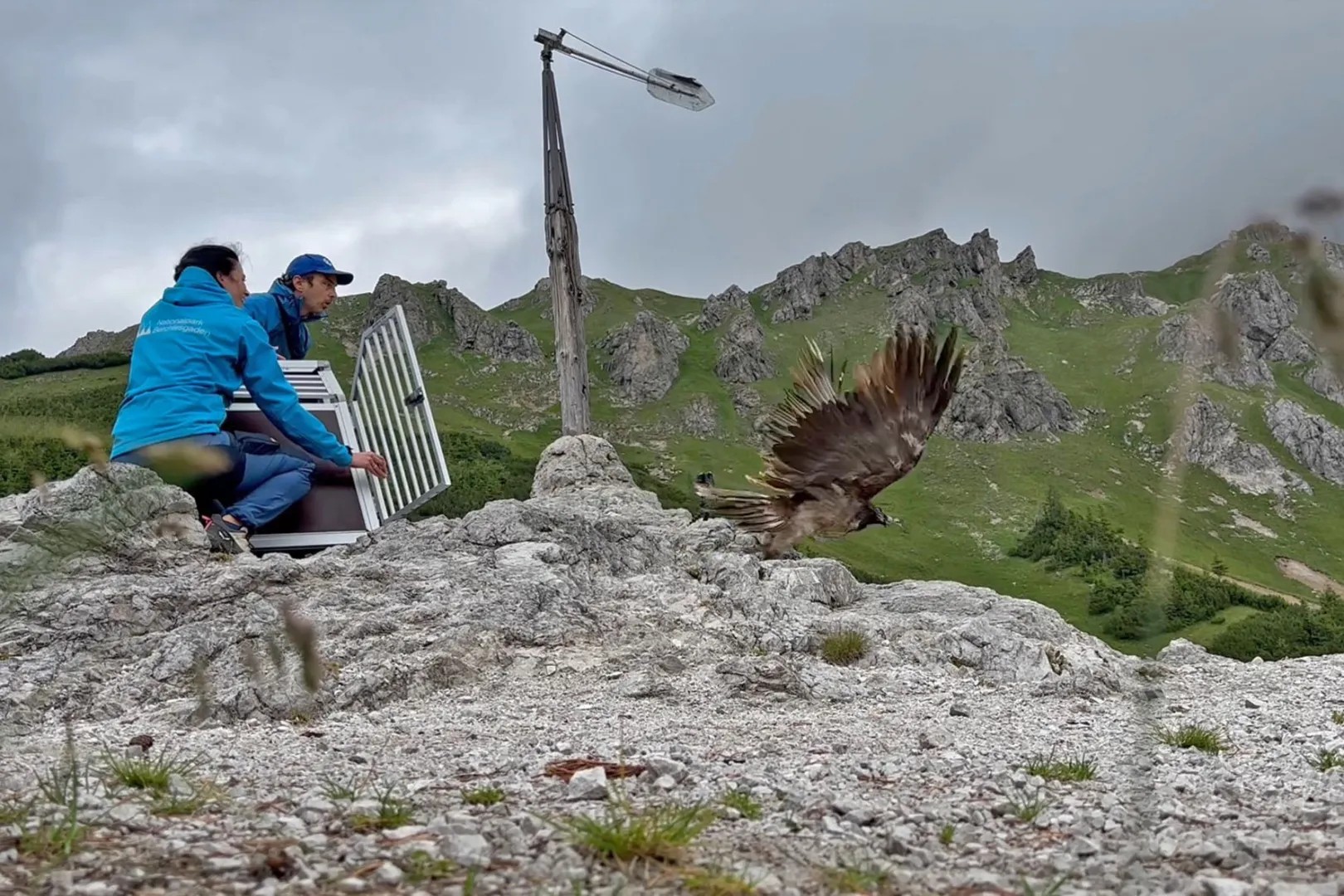
Every summer, our regular food supply for our captive Bearded Vultures drastically declines due to the weather conditions, mainly in our centre in Lledia where we principaly depend on the rabbit breeders who significantly reduce their production in the summer. So, we have to prepare for the food shortage in advance, and with the COVID-19 measures and consequences, this would have been even more difficult this time. But, thanks to a very generous donation, our problem was fixed early on this time! ‘Animalfoods’ donated 1.000kg of food to our centres in Spain, and 500kg of food to our partners in Austria to support our Bearded Vulture conservation efforts.
A generous donation in aid of Bearded Vultures
It all started with a casual conversation about conservation projects between Dennis De Caluwé from Animalfoods and Olivier Vercauteren from Planckendael Zoo. Dennis wanted to support a project, and Olivier kindly suggested our Bearded Vulture captive breeding work as he thought it would be useful, especially due to the food shortages in the summer.
The 1.000kg of food to the VCF will be divided between the two centres we manage in Spain — Vallcalent Specialised Breeding Centre in Lleida and Bearded Vulture Captive Breeding Centre of Guadalentín in Carzola. Vallcalent hosts the most challenging pairs within our Bearded Vulture Captive Breeding Network (EEP) because with the facilities and the expertise of Alex Llopis (VCF’s Captive Breeding Manager and Bearded Vulture EEP Coordinator), vultures get a higher chance of breeding successfully. The VCF also assumed the management of Guadalentín in the beginning of 2020, which is a very important centre as it breeds the most chicks every season and specialises in fostering and adoptions. This donation meets our food requirements needs for the entire summer period.
The company also donated 500kg of food to Richard Faust Bearded Vulture Specialised Captive Breeding Centre in Austria (the biggest centre in the EEP), managed by Hans Frey, an expert in captive breeding and a pioneer in the reintroduction of the species to the Alps. He is also the previous Bearded Vulture Captive Breeding Network coordinator and is part of the VCF’s Advisory Board.
Animalfoods is based in Belgium and delivers high quality frozen food to zoos. A big thank you again to Animalfoods for the food donation and for also covering the transportation costs.
Feeding Bearded Vultures

Bearded Vultures feed primarily on bones, but when they are nestlings, especially during their first four weeks, they need to eat soft tissue exclusively. Also, when they are about 35 days old, and up to becoming fledglings, young birds need to eat double the quantity of food than fully-grown birds. Apart from the diet, feeding routines and the way food is offered can also influence the welfare of the birds. As poor feeding practices are considered the second cause of death in captive Bearded Vultures, we have produced the Guidelines for feeding Bearded Vultures in captivity, available in English, French, Bulgarian and Russian.
Importance of captive-breeding
The Vulture Conservation Foundation (VCF) coordinates the Bearded Vulture Captive Breeding Network (EEP) of zoos, specialised breeding centres, recovery centres and private collections. This involves closely working with colleagues across Europe to ensure the best breeding results from the 178 birds within the network.
Captive-breeding of Bearded Vultures is essential for their reintroduction to the wild and it was a critical component to bring back the species to the Alps after their extinction. For the past few decades, the VCF has been releasing captive-bred Bearded Vultures into the wild to reintroduce or reinforce the population of the species across Europe. Between 1986 and 2019, the VCF together with its partners released a total of 323 juvenile Bearded Vultures into the wild, including 227 in the Alps & Pre-Alps, and 63 in Andalucía. In 2019, the VCF and its partners released a total of 22 Bearded Vulture – nine of them in Andalusia – helping boost local populations, and making it the best Bearded Vulture Release Season to date!
Animalfoods is a wholesaler of animal food in Europe. You can learn more on their website or by emailing info@animalfoods.be.




